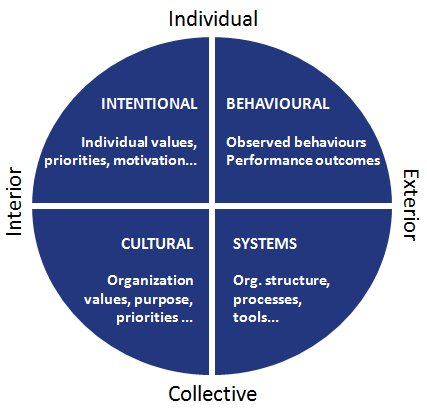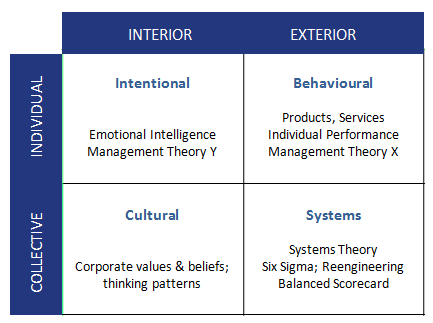Navigating Business & Leadership in the 21st Century
Central to our approach is the employment of the Integral Model to Business and Leadership. This comprehensive framework developed by the internationally renowned philosopher, Ken Wilber, has been widely acclaimed as one of the most relevant business and leadership models for the 21st century. The model allows us to embrace a diversity of leading-edge insights, theories, and practices and connect each in a manner that strengthens their individual benefits to produce truly powerful results.
What is Integral?
Integral is defined as comprehensive, whole, all-inclusive, complete. Knowledge is now fully global. This means that for the first time in history, the sum total of human knowledge is available to us: the knowledge, experience and wisdom of pre-modern, modern and post-modern worlds. What Integral does is literally take the best of everything that all the various cultures have to offer and places it on a map (an all-inclusive integral map). This may sound rather esoteric and complicated ‘pie-in-the-sky’—far removed from real-world business concern. Yet, the results turn out to be surprisingly simple and elegant. Indeed, it is now being successfully applied in many realms in addition to Business and Leadership, including Health Care, Education, Politics, Psychology, Ecology, Coaching and many others.
The Integral Model makes clear that every event or situation may be understood within the context of interior and exterior dimensions in both the individual and collective realms. It connects with as many potentials as possible so as to identify and include the possible solutions. Regardless of the scope and ‘depth’ of the organizational situation or need, by applying the Integral Framework, we are able to analyze and assess even the most complex issues in a balanced and comprehensive manner. This is what makes this approach so powerful and leading-edge.
The Integral Model

Learn More …
The Integral Model integrates the four major theories of business management:
- Theory X — which stresses individual behaviour;
- Theory Y — which focuses on psychological understanding;
- Cultural Management — which stresses organizational culture; and
- Systems Management– which emphasizes the social system and its governance.
Because of its holistic approach, the model provides a comprehensive framework for situating and understanding modern approaches to business and leadership. It shows how each, while valid and useful in its own right, is considered partial. Utilizing the Integral Approach we are able to honour the benefits of other business theories and applications such as Systems Theory, for example, while recognizing that other approaches (especially from the Interior dimension) also contribute to a fuller picture of reality. This enables us to develop more comprehensive solutions to today’s difficult leadership and business challenges. Below are some common examples of leadership theory and practice in the context of the Integral Model.
Examples of how the Integral Model includes other Leadership/Business Approaches

